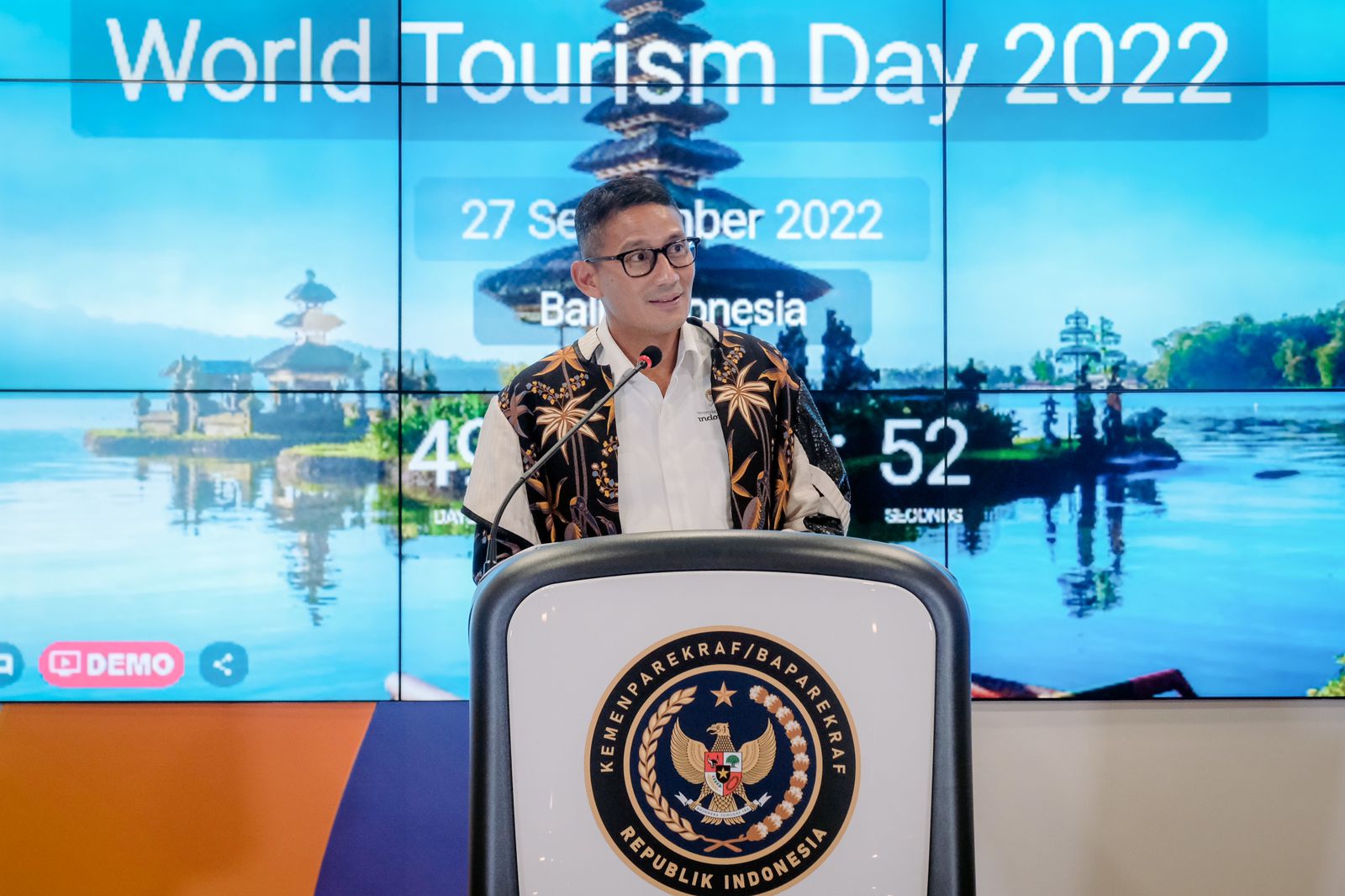World Tourism Day Inspiring Sustainable Adventures

Rethinking Tourism: Navigating Towards Sustainable Travel
The Current State of Tourism
In recent years, tourism has undergone significant growth, with more people than ever before venturing out to explore new destinations and cultures. While this surge in travel brings numerous benefits, it also raises concerns about its impact on the environment, local communities, and cultural heritage. As we celebrate World Tourism Day, it’s crucial to reflect on the current state of tourism and consider how we can make it more sustainable for future generations.
Challenges and Opportunities
One of the primary challenges facing the tourism industry is the negative environmental impact associated with mass tourism. From carbon emissions from air travel to pollution and waste generated by tourists, the ecological footprint of travel is undeniable. However, amidst these challenges lie opportunities for innovation and change. Sustainable tourism practices, such as eco-friendly accommodations, carbon offset programs, and responsible wildlife tourism, offer promising solutions to mitigate these environmental impacts.
Community Engagement and Empowerment
Beyond environmental concerns, tourism also has social implications, particularly for local communities in popular tourist destinations. Overtourism can lead to overcrowding, cultural commodification, and economic disparities. To address these issues, community engagement and empowerment are essential. By involving local communities in tourism decision-making processes, supporting small-scale enterprises, and promoting cultural exchange, we can ensure that tourism benefits everyone involved, not just large corporations.
Preserving Cultural Heritage
Cultural heritage is a significant aspect of tourism, attracting travelers eager to experience the rich history, traditions, and customs of different regions. However, the commodification and commercialization of cultural heritage pose threats to its preservation. To safeguard cultural heritage, it’s crucial to promote responsible tourism practices that respect local customs and traditions. This may involve implementing visitor management strategies, supporting cultural preservation initiatives, and fostering meaningful interactions between tourists and local communities.
Education and Awareness
Central to rethinking tourism is education and awareness. Many travelers may not fully understand the impact of their actions or the importance of sustainable travel practices. Therefore, raising awareness about the environmental, social, and cultural dimensions of tourism is paramount. This can be achieved through educational campaigns, community outreach programs, and sustainability certifications for tourism businesses. By empowering travelers with knowledge, we can inspire them to make more informed and responsible choices while exploring the world.
Government Policies and Regulations
While individual actions play a crucial role in promoting sustainable tourism, government policies and regulations are equally important. Governments have the power to enact laws and policies that incentivize sustainable practices, protect natural and cultural resources, and regulate tourism activities. This may include implementing visitor quotas in sensitive areas, enforcing environmental protection measures, and investing in infrastructure for sustainable tourism development. By working in collaboration with the tourism industry and local communities, governments can create a framework for responsible and sustainable tourism growth.
Collaboration and Partnership
Lastly, collaboration and partnership are essential for driving meaningful change in the tourism industry. Sustainable tourism requires collective effort from various stakeholders, including governments, businesses, NGOs, academia, and local communities. By fostering partnerships and sharing best practices, we can leverage the collective expertise and resources to address the complex challenges facing tourism. Together, we can create a more sustainable and inclusive tourism industry that benefits both people and the planet.
Conclusion
As we celebrate World Tourism Day and reflect on the theme of “Rethinking Tourism,” it’s evident that the future of travel lies in sustainability, community empowerment, and cultural preservation. By addressing the environmental, social, and economic dimensions of tourism, we can create a more resilient and responsible tourism industry that enriches lives and protects our planet for generations to come. Through collective action and shared commitment, we can navigate towards a future where tourism truly becomes a force for good. Read more about world tourism day rethinking tourism
Navigating Tourism Insights from the Department of Travel

Insights from the Department of Travel
Navigating Tourism Trends
Within the complex tapestry of the travel industry, the Department of Travel serves as a beacon of insight, offering valuable guidance on navigating the ever-evolving landscape of tourism. With expertise drawn from extensive research and practical experience, the department provides invaluable insights into emerging trends, helping stakeholders anticipate shifts in consumer behavior and adapt their strategies accordingly.
Strategic Tourism Approaches
At the heart of the department’s mission lies a commitment to developing strategic approaches that foster sustainable growth and enhance the visitor experience. By analyzing market dynamics, consumer preferences, and destination potentials, the department formulates tailored strategies designed to maximize the economic, social, and environmental benefits of tourism. These initiatives aim to strike a delicate balance between promoting tourism and preserving the integrity of destinations for future generations.
Promoting Responsible Travel
In an era marked by increasing awareness of environmental and social issues, the Department of Travel places a strong emphasis on promoting responsible travel practices. Through educational campaigns, policy advocacy, and industry partnerships, the department encourages travelers to minimize their carbon footprint, respect local cultures, and support communities in destinations they visit. By championing responsible tourism, the department strives to ensure that travel remains a force for positive change in the world.
Community Engagement Initiatives
Recognizing the pivotal role of local communities in shaping the tourism experience, the department actively engages with stakeholders at the grassroots level. Through participatory planning processes, community consultations, and capacity-building initiatives, the department empowers residents to take ownership of tourism development in their areas. By fostering a sense of pride and stewardship, these community engagement efforts contribute to the sustainable management of destinations and the preservation of cultural heritage.
Harnessing Technology for Innovation
In an increasingly digital world, the Department of Travel leverages technology as a powerful tool for innovation and efficiency. From data analytics and market research to destination management systems and mobile applications, the department embraces cutting-edge technologies to streamline operations, enhance visitor experiences, and drive growth in the tourism sector. By embracing innovation, the department ensures that it remains at the forefront of industry trends and best practices.
Crisis Management and Resilience
In times of crisis, such as natural disasters, pandemics, or political unrest, the Department of Travel plays a crucial role in coordinating response efforts and mitigating the impact on tourism stakeholders. Through effective communication strategies, contingency planning, and collaboration with relevant agencies, the department helps restore traveler confidence, support affected communities, and facilitate recovery in affected destinations. By demonstrating resilience in the face of adversity, the department strengthens the industry’s capacity to bounce back from challenges.
Policy Advocacy and Regulation
As the custodian of tourism policy and regulation, the Department of Travel works tirelessly to create an enabling environment for sustainable tourism development. Through evidence-based policymaking, stakeholder consultations, and legislative reforms, the department seeks to address pressing issues such as overtourism, environmental degradation, and socio-economic disparities. By advocating for policies that balance the interests of all stakeholders, the department ensures that tourism contributes positively to both destination communities and the broader economy.
International Collaboration and Partnerships
Recognizing the interconnected nature of the global tourism industry, the Department of Travel actively engages in international collaboration and partnerships. By sharing best practices, exchanging knowledge, and fostering cooperation with other countries and international organizations, the department enhances its capacity to address transnational challenges and seize opportunities for mutual benefit. Through diplomacy and dialogue, the department builds bridges between nations and promotes a more inclusive and sustainable tourism landscape.
Capacity Building and Training
To ensure the long-term sustainability of the tourism sector, the Department of Travel invests in capacity building and training initiatives for industry professionals, policymakers, and destination managers. By providing access to resources, workshops, and skill-building programs, the department equips stakeholders with the tools and knowledge they need to navigate the complexities of the tourism industry effectively. Through continuous learning and professional development, the department fosters a culture of excellence and innovation that drives positive change in the sector.
Empowering Future Generations
As custodians of the tourism industry, the Department of Travel has a responsibility to empower future generations of travelers, professionals, and policymakers. Through educational outreach programs, mentorship opportunities, and youth engagement initiatives, the department inspires young people to become advocates for responsible and sustainable tourism. By nurturing a new generation of leaders who are passionate about preserving the world’s cultural and natural heritage, the department ensures that tourism remains a force for good in the years to come. Read more about tourism department
Nurturing Destinations Tourism Enhancement Fund Strategies

Unlocking the Potential of Tourism Enhancement Fund
Driving Growth and Innovation
The Tourism Enhancement Fund stands as a beacon of hope, driving growth and innovation within the tourism sector. Through strategic investments and forward-thinking initiatives, this fund has paved the way for transformative change, unlocking new opportunities and revitalizing destinations around the world. From infrastructure development to sustainable tourism projects, the fund’s impact knows no bounds.
Empowering Communities and Promoting Prosperity
At the heart of the Tourism Enhancement Fund lies a commitment to empower communities and promote prosperity. By supporting local businesses, creating job opportunities, and fostering entrepreneurship, the fund has become a catalyst for economic development in tourism-dependent regions. Through collaborative efforts with stakeholders, it has brought about positive change and lasting benefits for communities.
Fostering Sustainable Tourism Practices
Sustainability is a cornerstone of the Tourism Enhancement Fund’s ethos. Recognizing the importance of preserving natural resources and cultural heritage, the fund has championed sustainable tourism practices. From eco-friendly initiatives to conservation projects, it strives to ensure that tourism development is balanced with environmental stewardship, leaving a positive legacy for future generations to enjoy.
Enhancing Visitor Experiences and Destination Appeal
Visitor experiences lie at the heart of tourism, and the Tourism Enhancement Fund is dedicated to enhancing them. By investing in attractions, amenities, and cultural experiences, the fund aims to elevate destination appeal and create memorable experiences for travelers. From iconic landmarks to off-the-beaten-path gems, the fund’s contributions have enriched destinations and captivated visitors worldwide.
Investing in Infrastructure and Accessibility
Infrastructure plays a crucial role in shaping the tourism landscape, and the Tourism Enhancement Fund recognizes its importance. Through investments in transportation, accommodation, and accessibility initiatives, the fund has improved connectivity and facilitated easier access to destinations. These investments not only enhance the visitor experience but also support economic growth and development.
Promoting Cultural Preservation and Heritage Tourism
Preserving cultural heritage is paramount to the Tourism Enhancement Fund’s mission. By supporting heritage tourism initiatives and cultural preservation projects, the fund ensures that unique traditions and landmarks are safeguarded for future generations. Through partnerships with local communities and heritage organizations, it fosters a deeper appreciation for cultural diversity and heritage conservation.
Driving Destination Revitalization and Transformation
Destination revitalization is a key focus area for the Tourism Enhancement Fund. By investing in infrastructure upgrades, marketing campaigns, and destination branding initiatives, the fund breathes new life into tourism hotspots and drives transformational change. From revitalizing historic districts to reimagining urban landscapes, its efforts have revitalized destinations and reinvigorated tourism economies.
Supporting Innovation and Entrepreneurship
Innovation is the lifeblood of the tourism industry, and the Tourism Enhancement Fund fuels it through its support for entrepreneurship and innovation. By providing grants, loans, and technical assistance to tourism startups and small businesses, the fund fosters innovation and creativity. From tech startups to experiential tourism ventures, it empowers entrepreneurs to pioneer new ideas and drive industry growth.
Catalyzing Collaboration and Partnership
Collaboration is key to the Tourism Enhancement Fund’s success. By forging partnerships with governments, businesses, NGOs, and community organizations, the fund maximizes its impact and leverages resources more effectively. Through collaborative initiatives and joint ventures, it addresses complex challenges and unlocks new opportunities for tourism development.
Creating a Sustainable Legacy for Future Generations
As we look to the future, the Tourism Enhancement Fund remains committed to creating a sustainable legacy for future generations. Through its investments and initiatives, it strives to ensure that tourism development is equitable, inclusive, and environmentally responsible. By safeguarding natural and cultural assets, empowering communities, and fostering innovation, the fund paves the way for a brighter and more sustainable tourism future. Read more about tourism enhancement fund
Boosting Tourism Development Fund Initiatives Unveiled

Boosting Tourism: Development Fund Initiatives Unveiled
Investing in Sustainable Travel
Tourism development funds play a crucial role in advancing sustainable travel initiatives around the world. By investing in projects that promote environmental conservation, support local communities, and preserve cultural heritage, these funds ensure that tourism growth is balanced with responsible practices. From eco-friendly accommodations to wildlife conservation efforts, development fund initiatives are shaping the future of travel towards a more sustainable and ethical industry.
Empowering Local Communities
One of the primary objectives of tourism development funds is to empower local communities and enhance their socio-economic well-being. These funds support community-based tourism initiatives, providing opportunities for local residents to participate in and benefit from the tourism industry. Whether through skills training programs, small business grants, or cultural preservation projects, development funds help communities harness the economic potential of tourism while preserving their unique way of life.
Driving Innovation and Growth
Tourism development funds serve as catalysts for innovation and growth within the tourism sector. By providing financial support to entrepreneurs, startups, and small businesses, these funds fuel creativity and drive entrepreneurial spirit. From the development of new tourism attractions to the implementation of cutting-edge technologies, development fund initiatives are driving innovation and positioning destinations for sustainable growth in a competitive global market.
Fostering Collaboration and Partnerships
Effective utilization of tourism development funds often involves fostering collaboration and partnerships between various stakeholders. Governments, non-profit organizations, private sector entities, and local communities work together to identify priorities, leverage resources, and implement projects that benefit all parties involved. Through collaborative efforts, development funds can maximize their impact and address complex challenges such as infrastructure development, destination marketing, and community empowerment.
Promoting Cultural Preservation
Preserving cultural heritage is a key component of sustainable tourism development, and tourism development funds play a vital role in supporting these efforts. Whether through heritage conservation projects, cultural festivals, or traditional craft workshops, these funds help safeguard the cultural identity of destinations and promote appreciation for local traditions among visitors. By preserving cultural heritage, development funds ensure that tourism contributes to the enrichment of communities rather than their exploitation.
Supporting Responsible Tourism Practices
Tourism development funds are instrumental in promoting responsible tourism practices that minimize negative impacts on the environment and local communities. From implementing waste management programs to promoting responsible wildlife viewing guidelines, these funds support initiatives that encourage travelers to be mindful of their ecological and cultural footprint. By fostering responsible tourism practices, development funds help safeguard the integrity of destinations and ensure the long-term sustainability of the tourism industry.
Enhancing Infrastructure and Accessibility
Infrastructure development is essential for supporting tourism growth and enhancing visitor experiences. Tourism development funds allocate resources towards improving transportation networks, upgrading accommodation facilities, and enhancing tourist attractions to make destinations more accessible and appealing to visitors. By investing in infrastructure projects, development funds lay the foundation for sustainable tourism development and economic prosperity in communities.
Measuring Impact and Accountability
Accountability and transparency are essential aspects of effective tourism development fund management. These funds employ rigorous monitoring and evaluation mechanisms to measure the impact of funded projects and ensure accountability to stakeholders. By tracking key performance indicators such as visitor numbers, economic benefits, and environmental indicators, development funds can assess the effectiveness of their investments and make informed decisions for future funding allocations.
Navigating Challenges and Opportunities
Despite their positive impact, tourism development funds also face challenges and obstacles in their quest to promote sustainable tourism. Issues such as over-tourism, environmental degradation, and socio-cultural tensions require innovative solutions and proactive management strategies. Development funds must navigate these challenges while seizing opportunities for growth and positive change within the tourism industry.
Sustaining Momentum for Future Growth
As we look towards the future, tourism development funds will continue to play a pivotal role in shaping the trajectory of the tourism industry. By prioritizing sustainability, community empowerment, and responsible tourism practices, these funds can sustain the momentum for future growth and ensure that tourism remains a force for positive change in destinations around the world. Through strategic investments and collaborative efforts, development funds can unlock the full potential of tourism as a catalyst for economic development, cultural exchange, and environmental conservation. Read more about tourism development fund
